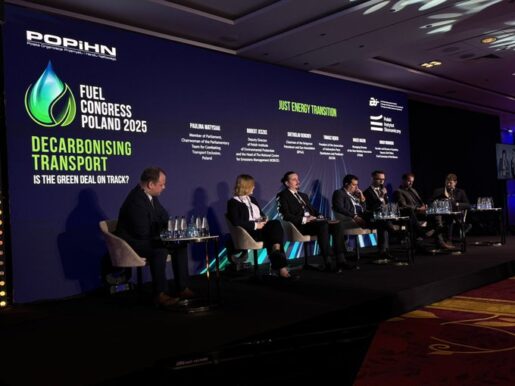On 25 March 2025. Robert Jeszke, Deputy Director of IOŚ-PIB for Emissions Management and Head of KOBiZE and CAKE participated in the Polish Climate Congress 2025, during which he moderated a panel entitled ‘Climate and energy transition – will Polish and European industry remain competitive?’. The discussion covered key issues devoted to the challenges and opportunities presented by the European Green Deal, EU climate policy and the changing regulatory environment. The panel brought together leading experts and industry leaders to share their views and recommendations.
The panel comprised prominent experts: Aleksandra Stanek-Kowalczyk (Partner, EY), Anita Bednarek (Sustainability Director, Goodvalley), Tomasz Zieliński (Chairman of the Board, PIPC), Piotr Mikusek, (Grupa Azoty S.A.), Wojciech Kędzia (President of the Management Board, Huta Łabędy), Krzysztof Kutek (Director Water and Climate Change, Arcadis), Bartosz Toczony (Director, Santander Bank Polska).
Against the backdrop of intensifying global economic competition and growing climate protection requirements, the Polish Climate Congress 2025 was the venue for a key debate on the future of industry in the face of the ambitious goals of the European Green Deal. Of particular importance was the discussion during the panel ‘Climate and energy transition – will Polish and European industry remain competitive?’, moderated by Robert Jeszke (KOBiZE / CAKE). Experts representing various industry sectors and financial institutions discussed the key challenges and opportunities related to EU climate policy.
Key findings from the discussion:
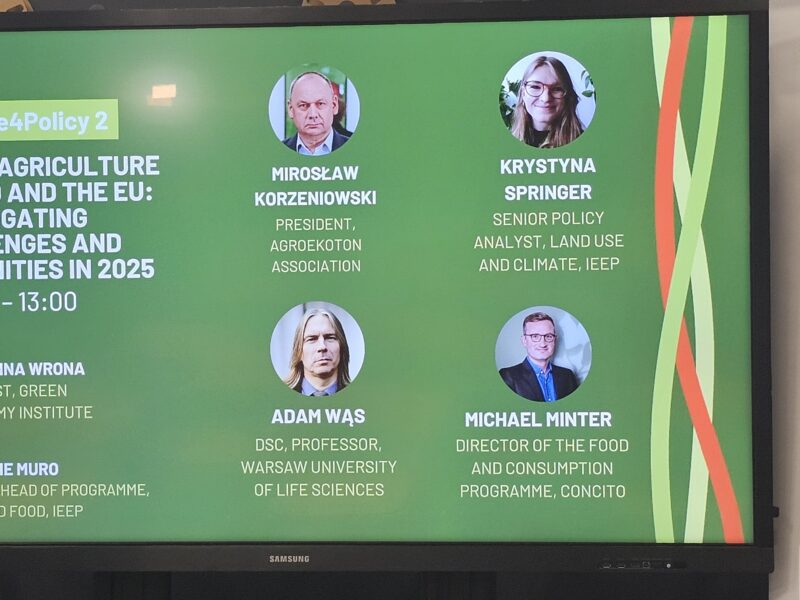
On the 28th March 2025, Adam Wąs, our CAKE Expert was a speaker at the Think2030 Conference “Think2030 Dialogue Poland. Towards a sustainable and secure Europe” organised by the Instytut Reform and Institute for European Environmental Policy (IEEP).
The panel discussion on building resilient agriculture in Poland and the EU highlighted the multifaceted nature of the sustainability transition.
Prof. Adam Wąs offered a comprehensive perspective, stressing that sustainable agriculture must be environmentally responsible, economically viable, and socially acceptable. He argued that increasing eco-efficiency hinges on implementing modern farming practices—such as optimized land, water, and nutrient use—alongside structural changes in the farm sector. He emphasized the need to support financially stable, adequately sized, and professionally managed farms, which are better equipped to adopt innovation and meet sustainability goals. While organic farming is widely promoted and supported, he argued for equal recognition of other eco-efficient farming systems that could use resources even more efficiently.
Regarding greenhouse gas (GHG) reduction, he expressed caution about implementing systems like AgriETS, warning of potential strain on already burdened farmers and risks to food security. According to analyses from the CAKE team, a deep reduction of GHG emissions in agriculture would come at the cost of lower food production, higher prices, and greater market instability and risk of carbon leakage. Instead, he called for clear production standards and coordinated incentives for farmers, processors, and researchers to develop practical, low-emission solutions tailored to local realities.
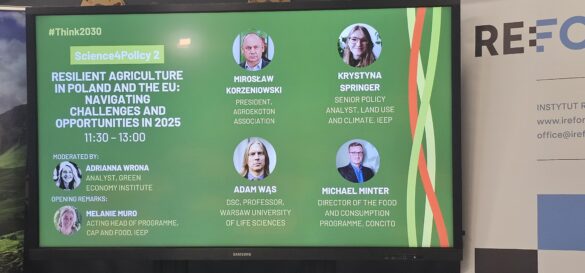
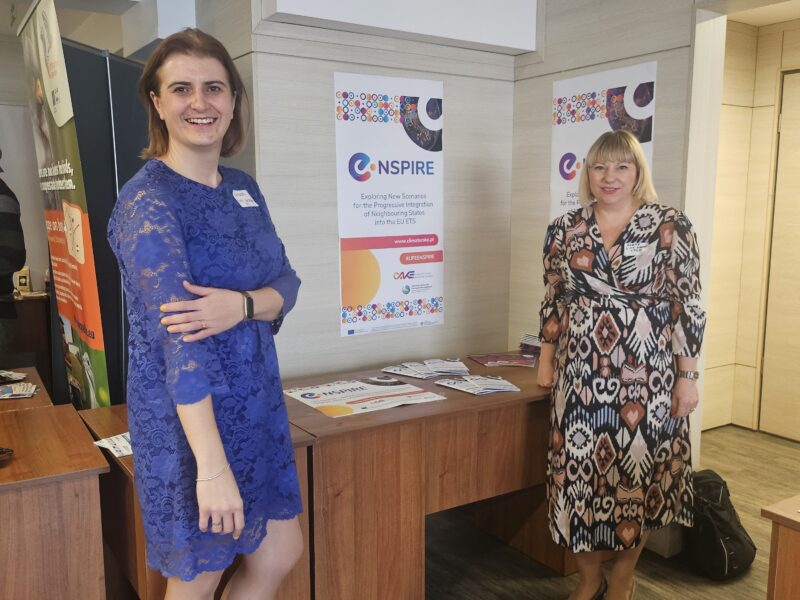
On the 24-26.03.2025 we had the pleasure to participate in the Central and Eastern Europe InterLIFE Platform Meeting which took place in Balmazújváros, Hungary organised by Hortobágy Environmental Association (Hortobágyi Nemzeti Park Igazgatóság).
During the meeting our CAKE experts Marta Rosłaniec and Aneta Tylka presented our experiences in the implementation of the LIFE Projects that are already completed LIFEClimateCAKEPL & LIFEVIIEW2050, as well as our new LIFE ENSPIRE project. The workshop focused on the different experiences in CEE countries regarding the number of applications and implementation of LIFE Projects in our region countries, i.e. Hungary, Poland, Slovakia, Czechia, Romania, Croatia.
On the first day of the conference Marta Rosłaniec presented our CAKE knowledge and achievements from the perspective of CAKE/KOBIZE/IOSPIB as the beneficiary of the LIFE projects.
It was also a great opportunity to present our new LIFE ENSPIRE project -“Exploring New Scenarios for the Progressive Integration of Neighbouring States into the EU ETS beyond 2050” to wider audience and other LIFE projects participants . At the Project Expo and Fair we met a lot of other very interesting and important nature and climate related LIFE Projects, and it was a great opportunity to network with them.
The LIFE ENSPIRE project aims to assess the potential impacts of the evolving European Union Emissions Trading System (EU ETS) and Carbon Border Adjustment Mechanism (CBAM) on the EU and selected neighbouring countries.
On the second day of the conference, the working group discussions focused on different aspects of the projects management – we participated in the financial and climate related groups. We presented our LIFE ENSPIRE project and it was a great possibility to echxange views and ideas with the representatives from CINEA – European Climate, Infrastructure and Environment Executive Agency and ELMEN EEIG.
It was a great great presentations and networking discussion on LIFE!
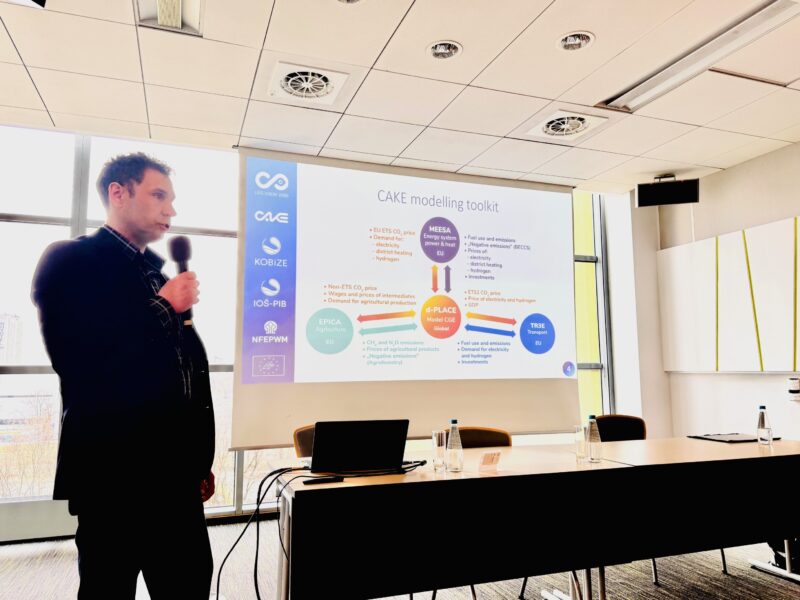
On 18 March 2025. Robert Jeszke, Deputy Director of IOŚ-PIB for Emissions Management and Head of CAKE/KOBiZE and Maciej Pyrka Head of Strategy, Analysis and Auctioning Team at KOBiZE/CAKE and the ENSPIRE project coordinator had the opportunity to participate in the Workshop of the Institute for Sustainable Development entitled ‘Long-Term Strategies for Climate Neutrality by 2050’.
During the meeting, Robert Jeszke presented information on past and current CAKE/KOBIZE/IOŚ-PIB projects, including the LIFE VIIIEW 2050 project, and presented the new CAKE project – LIFE ENSPIRE – ‘Exploring New Scenarios for the Progressive Integration of Neighbouring States into the EU ETS beyond 2050’. He indicated that the aim of the LIFE ENSPIRE project is primarily to:
Maciej Pyrka presented the CAKE modelling toolkit, the main results of the CAKE and LIFE VIIEW 2050 analysis and outlined possible next steps for the EU ETS after 2030. He emphasised that for the EU ETS to continue to play a key role in EU climate policy, further reform is needed. Several potential changes include :
As part of the key conclusions of the presentation by the KOBIZE/ CAKE representatives, it should be pointed out that CO2 carbon dioxide removal is key to achieving climate neutrality in the EU, and that it is impossible to achieve the 2050 targets without large-scale CO₂ removal/absorption.
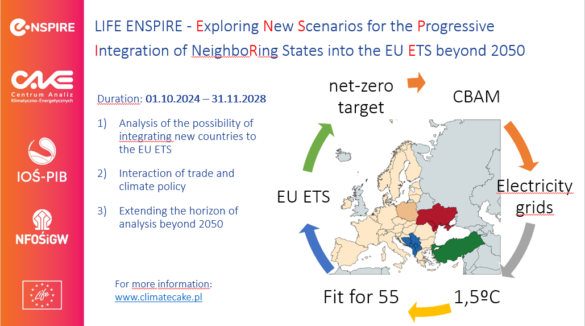
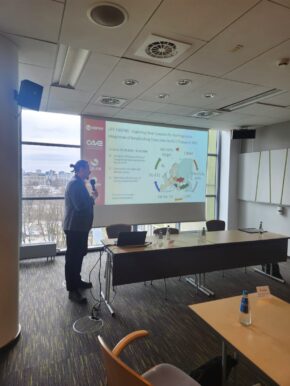
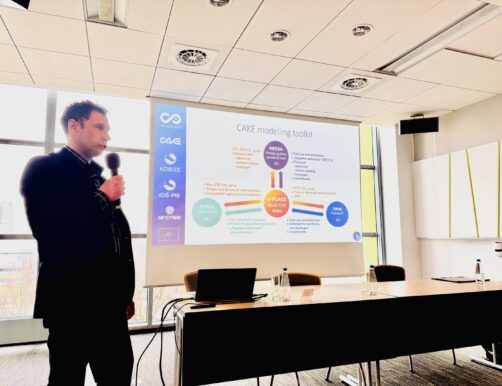
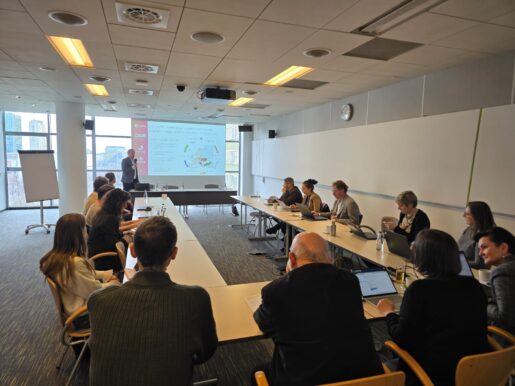
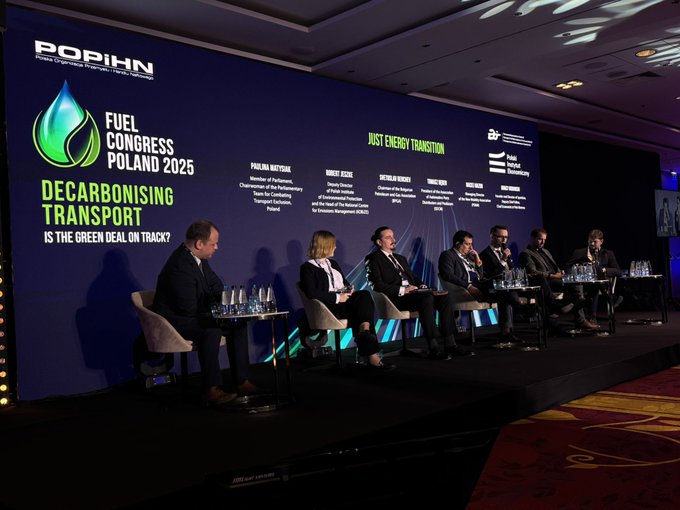
On 20 March 2025. Robert Jeszke, Deputy Director of IOŚ-PIB for Emissions Management and Head of CAKE/KOBiZE) participated in the Fuel Congress Poland 2025 ‘’Decarbonisation of Transport 2025. Is the Green Deal on the Right Path?’ organised by the Polish Organisation of Oil Industry and Trade (POPiHN).
Robert Jeszke took part in a panel entitled ‘Just Energy Transition’. The discussion was moderated by Krzysztof Krawiec (Polish Economic Institute) and the panel was attended by distinguished guests, including:
-Paulina Matysiak (Member of the Polish Parliament, Chair of the Parliamentary Group for Combating Transport Exclusion),
-Olga Tworek (Deputy Director of the Road Transport Department at the Ministry of Infrastructure),
-Svetoslav Benchev (President, Bulgarian Petroleum and Gas Association, Tomasz Bęben – President, Association of Automotive Parts Distributors and Manufacturers,
-Maciej Mazur – Managing Director, Polish New Mobility Association,
-Ignacy Morawski – Founder and Director, SpotData, Deputy Editor-in-Chief and Chief Economist, Puls Biznesu
During his presentation, Robert Jeszke focused on issues relating to the introduction of ETS2, i.e. the emissions trading scheme for the road transport sector, buildings and so-called other sectors. During his speech, he pointed out, among other things, the consequences of the introduction of ETS2, the costs which Poland and individual households will incur due to its implementation, and the aspects which will be most acute in Polish conditions – the expenses related to the implementation of ETS2 in the building sector and the costs resulting from its impact on transport.

